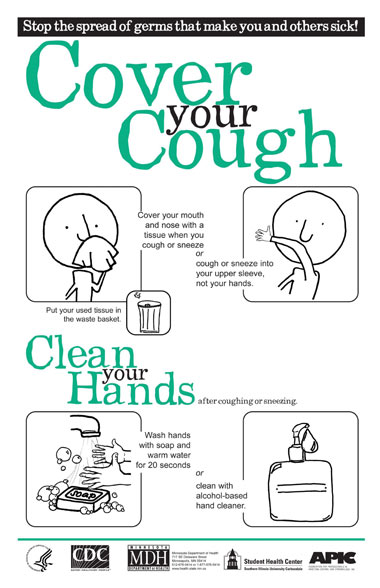August 19, 2009
SIUC prepared to respond to H1N1 flu virus
CARBONDALE, Ill. -- With the start of the new school year just days away, plans are in place at Southern Illinois University Carbondale to respond to the H1N1 flu virus.
Todd Sigler, chair of the All-Hazards Response and Recovery Committee and director of SIUC’s Department of Public Safety, said the University is closely following guidelines established by the Centers for Disease Control and Prevention (CDC) and continues to work with the Jackson County Health Department. Officials from the health department met with the All-Hazards committee earlier this month.
In addition, health department officials and medical staff at SIUC’s Student Health Center are planning for a mass immunization program when the H1N1 vaccine becomes available later this fall. The vaccination program will require two separate immunizations separated by at least three weeks.
Various steps are being taken across campus to reduce the risk of infection. Information Technology plans to have disinfectant wipes and hand sanitizers available in its four Computer Learning Centers, located in Faner, Communications and Rehn halls and the College of Applied Sciences and Arts building.
Hand sanitizers are available at cash registers/entrances at Student Center food service areas and in all offices. Posters reminding everyone of “The Three Cs -- Clean, Cover, Contain,” are posted throughout the building. Hand sanitizers are in many locations throughout the Student Recreation Center, as are gym wipes in each activity space for patrons to use before and after equipment usage.
University Housing will install hand-sanitizing stations in all dining halls by Thursday, Aug. 20. In addition, hand-sanitizing stations are in place at entrances to high-rise residence halls and in commons buildings for all areas. Housing staff is posting educational materials in all dining and residence halls.
As a novel flu virus, young people are more susceptible to infection and are experiencing higher morbidity and mortality rates from the H1N1 strain. Current CDC recommendations prioritize those ages 6 months to 24 years old, as well as those 25-65 with chronic diseases, for the H1N1 immunizations.
“That places college health programs in the forefront of immunizations efforts,” said Dr. Ted Grace, director of SIUC’s Student Health Center and a member of the All-Hazards committee. “However, we don’t know what kind of acceptance rate to expect from our students. Past outreach clinics for the seasonal flu have not been that well attended at SIUC.”
Grace emphasized that the H1N1 vaccinations will be available at no charge.
Faculty and staff who are pregnant, have chronic health disorders or who have compromised immune systems will be included in the initial vaccination program.
Miriam Link-Mullison, administrator of the Jackson County Health Department, also stressed the importance of everyone getting vaccinated for seasonal flu. Following CDC guidelines, the health department will hold seasonal flu clinics on campus in late September, which is earlier than in past years.
“We also will be providing support to the SIUC Student Health Center as it responds to H1N1 on campus this fall,” she added.
Grace said the Student Health Center will implement a “triage protocol” that will allow students with milder H1N1 symptoms to either self-treat and isolate themselves in place, or go to one of the nurse-staffed outreach programs available in the Student Center and Trueblood dining hall.
“Students visiting these sites will be assessed and given, as needed, a packet with acetaminophen, disposable thermometers, class excuse, facemasks to use when in close quarters with others, and a self-care handout from the CDC that lists symptoms that would trigger a patient to seek emergency care,” Grace explained.
The most consistent symptom with the H1N1 virus is fever, but the abrupt onset of a runny nose, cough, sore throat, body aches, nausea and diarrhea all may occur. According to the latest CDC guidelines, patients with the H1N1 infection should self-isolate until at least 24 hours after the fever is gone without the use of a fever-reducing medicine.
With the chancellor’s approval, the All-Hazards committee is communicating to faculty and staff via e-mail and during orientation sessions this week that it will be important during an infectious outbreak to be prepared to adjust policies to allow for higher rates of absenteeism. If they become ill, students, faculty and staff should not remain in class or in offices, where they can infect others.
In the event of high absenteeism due to the flu, faculty are asked to consider providing students with more distance-learning options via Internet tools. Ill students living within a reasonable driving distance will be encouraged to return home in personal vehicles and not use public transportation. If students living in residence halls cannot leave campus, plans are in place to temporarily isolate moderately ill students away from healthy students.
“The success of these efforts will depend on the incidence of disease on campus, the availability of anti-viral agents to treat the infection and student participation in the vaccination program, Grace said.
The University’s planning for H1N1 dates back to last April, when the All-Hazards committee began discussing the situation. At that time, the committee recommended, and Chancellor Samuel Goldman approved, a temporary suspension of SIUC-sanctioned travel to Mexico, based on guidance from the CDC. That suspension was later lifted.
In addition, hand-sanitizing stations were installed for spring commencement ceremonies and posters encouraging everyone to employ “The Three Cs -- Clean, Cover, Contain,” were distributed throughout campus.
For more information on the H1N1 virus, contact the Student Health Center at 618/453-3311 or visit http://shc.siuc.edu/health%20pages/Resource_page.htm

